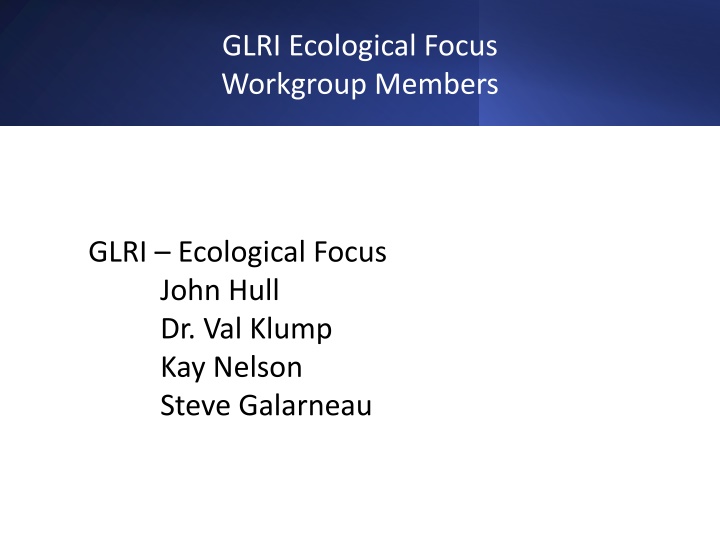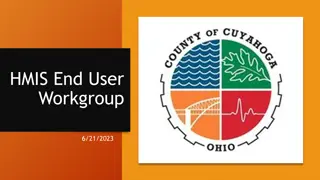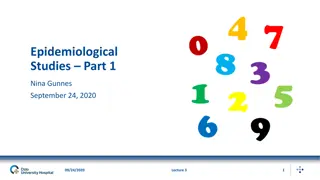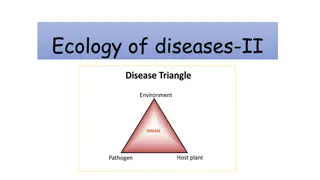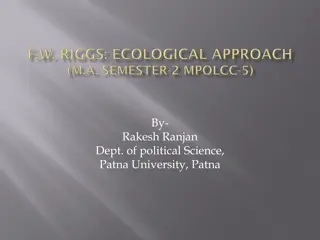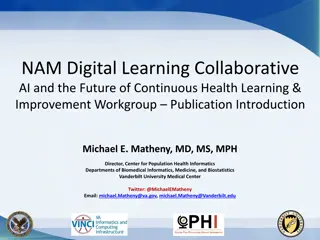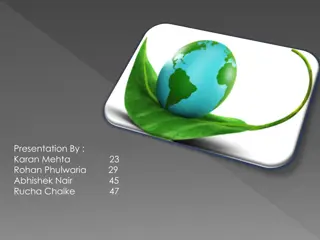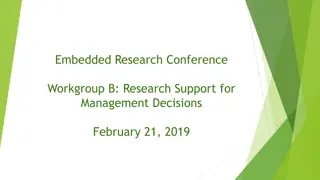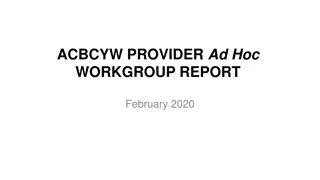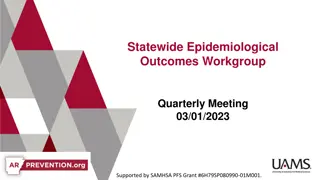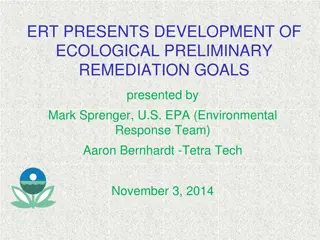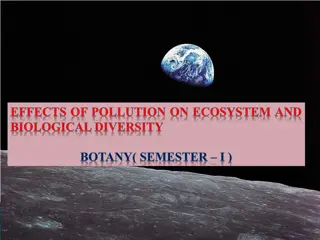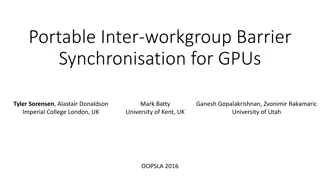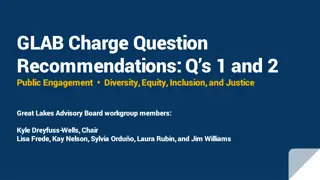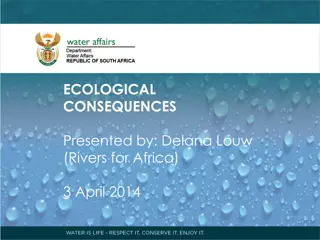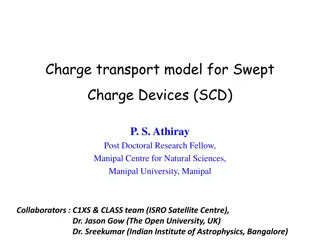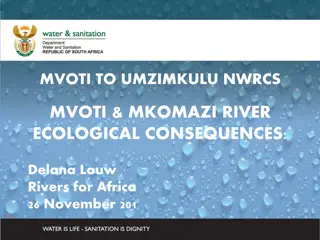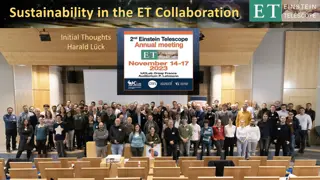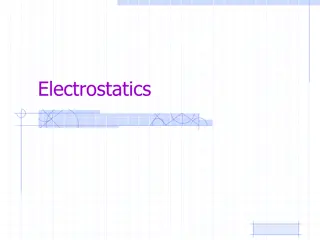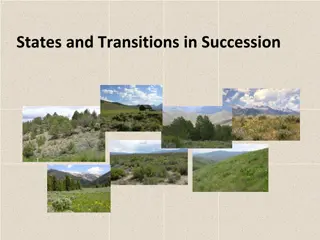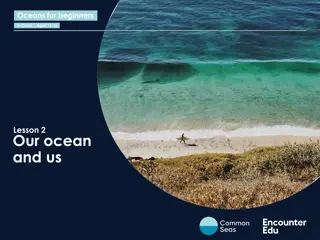GLRI Ecological Focus Workgroup and Related Charge Questions
The GLRI Ecological Focus Workgroup, comprised of members like John Hull, Dr. Val Klump, Kay Nelson, and Steve Galarneau, focuses on issues such as AOC remediation, invasive species control, nutrient reduction, and habitat restoration in the Great Lakes region. The workgroup addresses key questions related to GLRI funding, outcomes, leveraging across federal agencies, and communication strategies for better outreach and stakeholder engagement.
Download Presentation

Please find below an Image/Link to download the presentation.
The content on the website is provided AS IS for your information and personal use only. It may not be sold, licensed, or shared on other websites without obtaining consent from the author.If you encounter any issues during the download, it is possible that the publisher has removed the file from their server.
You are allowed to download the files provided on this website for personal or commercial use, subject to the condition that they are used lawfully. All files are the property of their respective owners.
The content on the website is provided AS IS for your information and personal use only. It may not be sold, licensed, or shared on other websites without obtaining consent from the author.
E N D
Presentation Transcript
GLRI Ecological Focus Workgroup Members GLRI Ecological Focus John Hull Dr. Val Klump Kay Nelson Steve Galarneau
GLRI Related Charge Questions: 3, 5 & 6 Theme 3: Seek Advice and Recommendation on GLRI Outreach Theme 5: Outcome Based Investments in the Great Lakes Theme 6: GLRI s Role in the Vitality and Reinvestment of Great Lakes Communities GLRI ECOLOGICAL FOCUS WORKGROUP
Charge Question 5 As we enter the next decade of GLRI funding, what are appropriate annual ecological and community-based outcomes (coupled with appropriate baselines and monitoring) to show that we are making progress in the areas of AOC remediation and delisting, invasive species control and prevention, nutrient reduction, and habitat restoration and protection, such that we can show a good return on investment?
Charge Question 6 How can GLRI projects and funding be further leveraged across Federal agencies and programs, including Opportunity Zones and Brownfields, to maximize environmental and economic benefits to Great Lakes communities?
C5 - Annual Ecological outcomes GLRI Ecological Focus Workgroup Charge Questions 5, & 6 Baseline data Metrics / Monitoring data Return on Investment C6 GLRI Leveraging across Federal Agencies and Programs Maximize Environmental and Economic benefits to Communities
Charge Question 3 How well are EPA and its federal, state and tribal partners communicating the goals, challenges and accomplishments of GLRI? Are there stakeholder groups that could be more effectively communicated with? What additional and/or innovative tools could be used to improve outreach to citizens, elected officials and partners?
C3 - Communication Goals Challenges Accomplishments of GLRI GLRI Ecological Focus Workgroup Charge Question 3 Who are we missing? How do we communicate better? Improve outreach Stakeholders' communication Financial & technical support leveraging existing resources e.g. libraries
Recommendations We recommend that the GLRI be recognized that is not just restoration, but also a protection and management program requiring a sustained commitment. Engage State and Tribal partners actively in the selection and funding of projects. Base projects on local priority areas. Not just a single subject or topic area. Assure close alignment of all Federal agencies that are part of the Federal Working Group with State and Tribal priorities. Evaluate GLNPO staffing needs and adjust commensurate with implementing the GLRI program. Leverage work by each member agency by communicating project proposals, implementation and reports with other agencies, states and tribes, science community, and public for full use.
Recommendations We recommend that the GLRI include a focus on restoring and protecting ecosystem services. account for the value of greenspaces, safe public access to waterways, and generally greater community interaction with natural systems. We recommend engaging environmental economists to establish baseline data needs, ecosystem services metrics, evaluation and milestones.
Recommendations We recommend providing management assistance funding to States and Tribes to hire boots-on-the-ground staff with technical expertise and skills in social sciences and community engagement. Augment local accessible communication technology resources through grants We recommend leveraging GLRI for sustained: employment opportunities through education in local communities investments by GLRI through support of long-term Operation and Maintenance (O&M) for projects.
Recommendations We recommend mapping Brownfield sites, Opportunity Zones and other agency and community programs with GLRI project proposals to maximize awareness and leveraging opportunities. We recommend greater engagement with business and industry to leverage their sustainability plans and vision with GLRI ecological services. Evaluate the nexus between Food, Energy, Water and Transportation.
Recommendations We recommend establishing a Cabinet Level position for Water as we do for Energy. Water quantity and quality - a national interest Climate resilience and sustainability Funding of Research and Development for early understanding of emerging challenges
